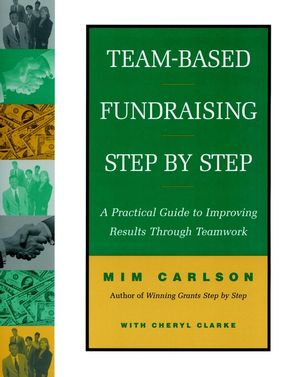Team-Based Fundraising Step by Step: A Practical Guide to Improving Results Through TeamworkISBN: 978-0-7879-4367-7
Paperback
144 pages
March 2000, Jossey-Bass
 This is a Print-on-Demand title. It will be printed specifically to fill your order. Please allow an additional 10-15 days delivery time. The book is not returnable.
|
||||||
"Although nonprofits have adopted a team approach in program
delivery and even management, many nonprofits have not used this
same successful approach in fundraising. This friendly guide argues
for creating a fundraising team that involves board members,
executive staff, line staff, and volunteers and gives examples of
how such teams can operate effectively. Along the way, the author
makes fundraising seem less mysterious and intimidating, and lead
the reader to feel confident and enthusiastic about creating a
successful fundraising team--no small achievement."--Jan Masaoka,
executive director, CompassPoint Services
Many nonprofits rely on a lone staff member or volunteer to raise the money they need to sustain or grow their programs. In this insightful resource, leading fundraiser Mim Carlson presents a practical approach to involving the entire organization in fundraising. In doing so, she helps board members, executive directors, and development directors turn their staff and volunteers into a cohesive team with clearly defined goals, specific roles, joint accountability, diverse talents and skills, and strong leadership.
In Team-Based Fundraising Step by Step, Carlson draws on popular team-building theory and successful techniques--as well as on her years of fundraising experience--to offer a fresh framework for helping teams become more unified in their fund development activities. She argues that individuals who act alone cannot make the most of fundraising strategies and instead advises readers to include the board of directors, the executive director, staff, and other volunteers in strategic planning and development.
This practical, step-by-step guide shows readers how to develop and implement a whole-organization approach. Providing both a rationale for this novel approach and illustrations of how it has produced successful results, Carlson offers important tools for effective collaboration:
* Detailed implementation strategies
* Sample forms
* Checklists
* Worksheets
* Summaries of roles and responsibilities
At last, nonprofit managers, board members, development professionals, and fundraisers at all levels of experience have a dynamic guide to making the most of fundraising opportunities through effective collaboration.
Many nonprofits rely on a lone staff member or volunteer to raise the money they need to sustain or grow their programs. In this insightful resource, leading fundraiser Mim Carlson presents a practical approach to involving the entire organization in fundraising. In doing so, she helps board members, executive directors, and development directors turn their staff and volunteers into a cohesive team with clearly defined goals, specific roles, joint accountability, diverse talents and skills, and strong leadership.
In Team-Based Fundraising Step by Step, Carlson draws on popular team-building theory and successful techniques--as well as on her years of fundraising experience--to offer a fresh framework for helping teams become more unified in their fund development activities. She argues that individuals who act alone cannot make the most of fundraising strategies and instead advises readers to include the board of directors, the executive director, staff, and other volunteers in strategic planning and development.
This practical, step-by-step guide shows readers how to develop and implement a whole-organization approach. Providing both a rationale for this novel approach and illustrations of how it has produced successful results, Carlson offers important tools for effective collaboration:
* Detailed implementation strategies
* Sample forms
* Checklists
* Worksheets
* Summaries of roles and responsibilities
At last, nonprofit managers, board members, development professionals, and fundraisers at all levels of experience have a dynamic guide to making the most of fundraising opportunities through effective collaboration.



